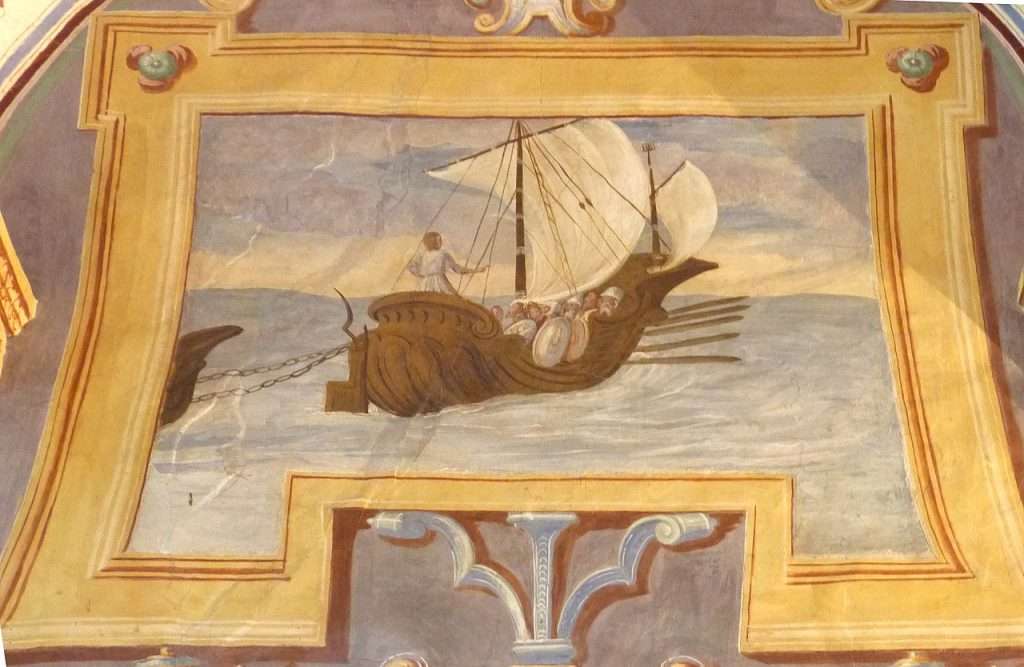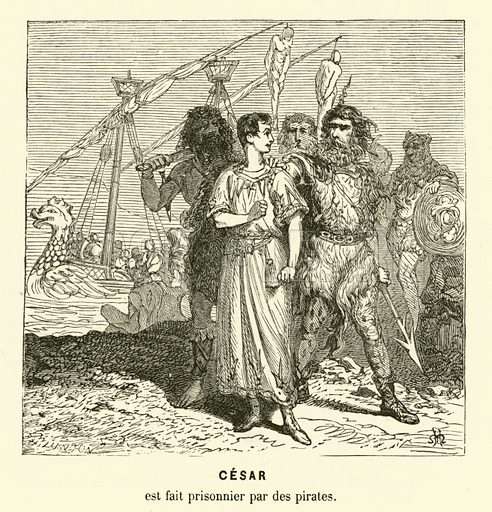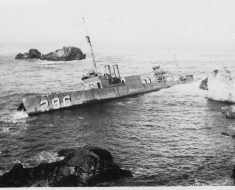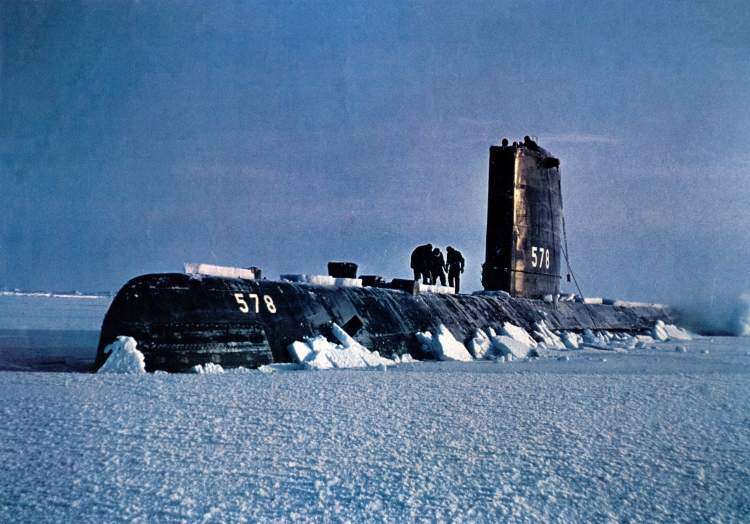In 75 BCE, Julius Caesar was captured by Cilician pirates while traveling across the Aegean Sea.
Despite being held for ransom, Caesar displayed audacious confidence, even suggesting the pirates increase the demanded amount, and once freed after the ransom was paid, he swiftly raised a fleet to pursue and capture them.
As a testament to his word and resolve, Caesar had the pirates crucified.
Contents
- Kidnapping Julias Caesar
- The Captive Turned Master
- The Ransom And Release
- Caesar’s Vow
- Caesar’s Retribution
Kidnapping Julius Caesar
The Aegean Sea, with its labyrinthine archipelago, was a challenging stretch of water for any mariner of ancient times. By 75 BCE, it had also become a treacherous domain due to the presence of the Cilician pirates.
These were not just opportunistic seafarers; they were organized groups of brigands who had turned piracy into a lucrative trade. They roamed far beyond their home base in Cilicia, a rugged coastal region in what is now southern Turkey, taking advantage of the vast and intricate coastlines to hide, strike, and retreat.
Read More Viking Sun Stones – The Crystal Used To Navigate
Julius Caesar, at this juncture in his life, was still in the formative stages of his illustrious career. While his family was of noble lineage, he was not yet endowed with the vast military prowess or political power that would later define him. His journey across the Aegean was driven by intellectual pursuits; he intended to study oratory in Rhodes, a center of learning and culture.
This endeavor was emblematic of Roman aristocrats of the era, for whom a robust education was a mark of distinction and a tool in the world of politics.
However, the journey took an unexpected turn when Cilician pirates, ever on the lookout for potential captives and plunder, spotted Caesar’s vessel. Recognizing the potential value of their catch—after all, it wasn’t every day they captured a Roman nobleman—the pirates quickly set their terms. Their initial ransom demand, 20 talents, was substantial, considering that a single talent could be a laborer’s wage for several years.

But it was Caesar’s response that truly marked the beginning of this legendary episode. Instead of fear or desperation, he chided them with a brazen confidence. By suggesting that they increase the ransom to 50 talents, Caesar was not only placing a higher value on his own worth but was also subtly mocking the pirates for their inability to recognize the stature of their captive.
This audacity, displayed even in the face of danger, was a trait that would echo throughout many episodes in Caesar’s life.
Read More The Roman Nemi Ships – Built By Caligula, Uncovered By Mussolini
The pirates, whether bemused by this show of arrogance or simply recognizing a chance to demand more, agreed to the increased sum. They probably did not anticipate the series of events their decision would set into motion, events that would see them go from captors to captives in a dramatic reversal of fortunes.
The Captive Turned Master
Within the bounds of captivity, where most individuals would find themselves overwhelmed by vulnerability and fear, Julius Caesar’s behavior and attitude emerged as a study in psychological fortitude.
His time among the Cilician pirates became less about his confinement and more about his relentless assertion of dominance, ultimately turning the dynamics of the entire hostage situation on its head.
Read More The Mary Celeste – A Maritime Mystery for the Ages
From the outset, Caesar refused to adopt the demeanor of a typical captive. It’s as if he regarded his abduction not as an ordeal, but rather as an unexpected detour in his life’s journey.
He carried himself not with the despondency or docility one might expect from a captive, but with the assertiveness of a leader, almost as if he were a guest rather than a prisoner.
This attitude, undeniably audacious, manifested in various ways. For one, Caesar took it upon himself to exercise regularly, maintaining his physical regimen.
This act was more than just about keeping fit; it was a symbolic demonstration of his unfettered spirit, showing that his captors had not truly confined him.

Furthermore, Caesar didn’t abandon his intellectual pursuits. He continued to write, composing speeches and poems. His audacity was so pronounced that he even demanded the pirates listen to his recitations.
He critiqued their responses, jesting that they were not cultured enough to appreciate his work and boldly proclaiming that, for their lack of taste, they deserved death. This was not the idle banter of a captive seeking to while away time but a calculated psychological tactic to maintain an upper hand.
His audacious behavior even extended to his sleeping habits. On one occasion, when he wished to rest, he commanded the pirates to refrain from making noise, a demand more befitting a general addressing his troops than a captive speaking to his captors.
Read More SS Baychimo – The Arctic Ghost Ship
Perhaps the most chilling aspect of Caesar’s time as a captive was his repeated declaration to the pirates of their impending doom. With an eerie calm, he often mentioned that upon his release, he would hunt them down and crucify them.
To the pirates, these threats might have seemed like the bluster of a prideful Roman, maybe even a way of coping with his situation. They laughed off his proclamations, not realizing that behind Caesar’s words was an iron will and the determination to see his promises through.
The Ransom And Release
In a historical context, ransom was a common practice among pirates, especially when they recognized the potential for profit in their captives. Capturing an individual of high status or of known wealth was akin to striking gold.
The higher the profile of the captive, the more substantial the ransom demand. Thus, the act of setting and negotiating ransoms was a delicate dance of gauging worth, anticipating the likelihood of payment, and ensuring the safety of both captive and captor until the transaction was complete.
Read More U-118 – An Unexpected Visitor to the Shores of Hastings
Against this backdrop, the ransom for Julius Caesar was set. His audacious suggestion to increase the amount was accepted, and the demand was relayed to his associates in Rome. The sum of 50 talents, by any measure, was enormous.
To put it into perspective, a talent in ancient times was a substantial amount of gold or silver, and this quantity was equivalent to the wages of a common laborer for many lifetimes.

Back in Rome, the news of Caesar’s capture must have sent shockwaves through the political and social elite. Given Caesar’s noble lineage and the relationships he had cultivated, it’s conceivable that there was a sense of urgency, if not panic, in securing his release.
The task of collecting such a vast sum would have required tapping into the wealth of various supporters, liquidating assets, and possibly even taking on debts. Nevertheless, the urgency and importance attached to Caesar’s safety ensured that the demanded sum was rapidly raised.
Read More USS Skate – The First Submarine To Surface At The North Pole
Once the ransom was delivered to the pirates, they upheld their end of the bargain. One can only imagine the scene of the exchange: a young Caesar, poised and perhaps even smirking, standing on the shores of the Aegean, watching as chests laden with gold and silver were handed over to his captors.
The pirates, perhaps believing they had concluded one of their most profitable ventures, might have reveled in their success, oblivious to the storm that was brewing on the horizon.
Why did Caesar crucify pirates?
The short answer as to why Caesar crucified pirates is: It was a promise. When Caesar was 25, pirates seized his ship while he was traveling. While he was held captive, Caesar promised to have the pirates crucified. Though the pirates did not take the threat seriously, Caesar had the pirates crucified after he was released.
Caesar’s Retribution
The ancient world, especially within the context of the Mediterranean, was one where honor, pride, and reputation were paramount. It wasn’t just about personal pride, but the larger perception of strength and authority. To be publicly slighted, humiliated, or taken advantage of—and to let such an incident go without response—could severely damage a leader’s standing.
For someone like Julius Caesar, who was destined to be a towering figure in Roman history, the kidnapping was not merely a personal affront; it was a challenge to his honor and future authority.
Read More Fort Drum – The Concrete Battleship
Upon his release, Caesar did not retreat to lick his wounds or thank the gods for his survival. Instead, fueled by a combination of personal indignation and a keen understanding of the importance of restoring his honor, he immediately set his sights on retribution.
Securing ships and a crew at his own expense showcased his resolve. For Caesar, this was a private matter, an unsettled debt of honor. He didn’t rely on the state or external financiers; he bore the cost himself.
Finding the pirates proved easier than they might have anticipated. Perhaps, flushed with the success of their recent ransom and the wealth it brought, they had grown complacent. Anchored off the coast of Asia Minor, they were caught off guard when Caesar, the captive they had so recently released after a hefty ransom, descended upon them with the full might of his makeshift fleet.

The capture of the pirates would have been a moment of intense satisfaction for Caesar. Their laughter and casual dismissal of his threats during his captivity would have echoed in their ears as the tables were turned, and they found themselves bound and at the mercy of the Roman they had once derided.
Transporting the pirates to Pergamon, Caesar sought a swift and decisive end to the matter. However, the bureaucratic machinery of the Roman administration, combined with the potential greed of the local governor, posed an unexpected obstacle.
The hesitation of the governor, likely eyeing the pirate’s ill-gotten wealth for himself, could have derailed Caesar’s plans.
Read More SS Richard Montgomery – The Time Bomb In The Thames
But Caesar was not to be denied. Demonstrating the decisiveness and authority that would characterize his later leadership, he bypassed the governor’s ambivalence and took matters into his own hands.
The crucifixion of the pirates was not just a punishment for their crimes; it was a public statement. Caesar was sending a clear message to friends and foes alike: he was a man of his word, a force to be reckoned with, and would not tolerate affronts to his honor.







